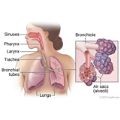Our Health Library information does not replace the advice of a doctor. Please be advised that this information is made available to assist our patients to learn more about their health. Our providers may not see and/or treat all topics found herein.
Topic Contents
Severe Acute Respiratory Syndrome (SARS)
Condition Basics
What is severe acute respiratory distress syndrome (SARS)?
Severe acute respiratory syndrome (SARS) is a respiratory illness that first infected people in parts of Asia, North America, and Europe in late 2002 and early 2003. SARS is caused by a type of coronavirus, which sometimes causes mild to moderate upper respiratory illness, such as the common cold. Most people get pneumonia. In some cases, these symptoms get worse very quickly.
How does it spread?
Like most respiratory illnesses, SARS is spread mainly through contact with infected saliva or droplets from coughing. You cannot get SARS from brief, casual exposure to an infected person, such as passing someone on the street. In general, you need to have close contact to become infected. Close contact includes living with or caring for a person who has SARS or breathing in air that an infected person exhaled. But under some conditions, SARS has spread within an apartment building and to health care workers. Outbreaks of SARS do not appear to be seasonal.
An infection may develop after:
- Sharing food or drink with an infected person.
- Hugging or kissing a person who has SARS.
- Close contact with an infected person.
- Getting the tiny droplets on your hands by touching contaminated surfaces or objects and then touching your eyes, nose, or mouth.
It is possible SARS can be transmitted in other ways, such as by touching objects that are contaminated with feces from an infected person. This could happen if people do not wash their hands after using the bathroom.
The disease does not appear to spread from a mother to her baby at birth.
What are the symptoms?
The main symptoms of SARS are a fever, a dry cough, shortness of breath, or difficulty breathing. A person with SARS also may experience a headache, muscle aches, a sore throat, fatigue, and diarrhea. An older person may feel generally unwell (malaise) and lose his or her appetite but not have a fever. For some people the symptoms get worse quickly, making a hospital stay necessary.
The incubation period—the time from when a person is first exposed to SARS until symptoms appear—is usually 3 to 7 days but may be as long as 10 days. Experts believe a person can spread the illness to others only while he or she has symptoms. As a precaution, though, the U.S. Centers for Disease Control and Prevention (CDC) recommends that people who have SARS stay home, except for doctor visits, until 10 days after their symptoms have gone away.
How is it diagnosed?
Your doctor may suspect SARS if you have a fever and you either have traveled to a SARS-affected area or have in the past 10 days been around a person who has SARS.
Your doctor may order several tests to find out the cause of your symptoms. A chest X-ray may be done if you are short of breath or coughing. A blood sample, sputum sample, or nasal swab may be done to detect bacteria or viruses. Your doctor may suspect that you have SARS if tests rule out any other cause for your symptoms, especially if you had contact with someone who has SARS or you traveled to an area experiencing a SARS outbreak. In this case, blood tests may be done to detect substances in your blood (antibodies) that form to fight the SARS virus.
You will need at least two tests for antibodies done on separate days to confirm an infection. You also may have tests to detect the genetic material (RNA) of the SARS virus. RNA testing is not available everywhere.
How is SARS treated?
Severe cases of SARS often require a hospital stay, especially if breathing problems develop. You will be placed in isolation to prevent passing the disease to others. There is no treatment that can cure SARS, but your symptoms will be treated to keep you as comfortable as possible.
How can you avoid being infected with SARS?
The best way to prevent the spread of SARS is to avoid areas where there is an outbreak and avoid contact with people who may be infected. You can also reduce your risk of infection by washing your hands often with soap or alcohol hand cleaners. If an outbreak occurs, try to avoid large public gatherings. The U.S. Centers for Disease Control and Prevention (CDC) does not recommend wearing face masks in public to prevent infection, although this is a common practice in Asian countries such as Japan.
Researchers are currently trying to develop vaccines to prevent SARS infection. But no vaccines are being tested in humans yet.
Related Information
Credits
Current as of: September 10, 2024
Author: Ignite Healthwise, LLC Staff
Clinical Review Board
All Ignite Healthwise, LLC education is reviewed by a team that includes physicians, nurses, advanced practitioners, registered dieticians, and other healthcare professionals.
Current as of: September 10, 2024
Author: Ignite Healthwise, LLC Staff
Clinical Review Board
All Ignite Healthwise, LLC education is reviewed by a team that includes physicians, nurses, advanced practitioners, registered dieticians, and other healthcare professionals.
This information does not replace the advice of a doctor. Ignite Healthwise, LLC disclaims any warranty or liability for your use of this information. Your use of this information means that you agree to the Terms of Use and Privacy Policy. Learn how we develop our content.
To learn more about Ignite Healthwise, LLC, visit webmdignite.com.
© 2024-2025 Ignite Healthwise, LLC.




